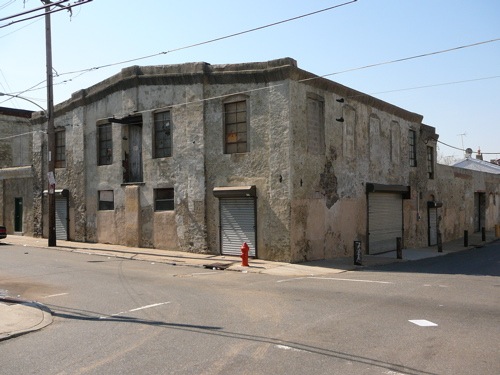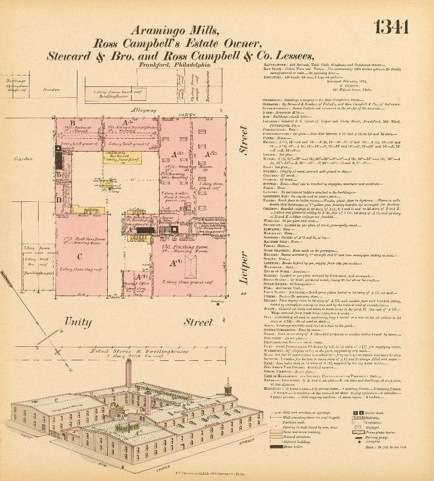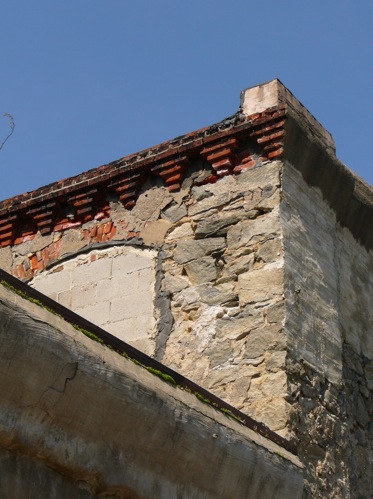
Southeast corner Unity and Leiper Streets (2007).
Aramingo Mills , c.1865
1412 Unity Street, Philadelphia PA 19124 (southeast corner of Leiper Street)
© Barbara M. Auwarter and
Joyce Halley, Workshop of the World (Oliver
Evans Press, 1990).
Enoch Roberts, about
1845, 1
began the
manufacture of ginghams and checks in a mill on the site
of an eighteenth century tannery. Here the first
commercially loomed turkish towels and damask tablecovers
were made. 2
Aramingo Mills continued to be a principal manufacturer
of dry goods under the direction of John Clendenning in
1857. 3
His mill was
noted for table-cloths and stair crash.
4
At the close of the Civil War, the present mill complex
was erected. The 1876, 1888, 1994, 1910, 1920 and 1929
city atlases refer to the site as the Aramingo Mills
although the ownership in 1923 is William E. Dudley and
in 1929 is John B. Sidebotham. 5

Hexamer General Survey #1341 (1879),
"Aramingo Mills, Ross Campbell's Estate Owner, Steward
& Bro. and Ross Campbell & Co.
Lessees."
The 1879 Hexamer Insurance Map also refers to this site
as "Aramingo Mills, Ross Campbell's Estate, Weaver,
Steward & Bro. and Ross Campbell & Co. Lessees,"
superintended by James Pollock, "not interested in the
profits of the business." 6
At this time,
Aramingo manufactured bedspreads, tablecloths, ginghams,
and Osnaburgs and employed "thirty-four men, six boys,
sixty-four girls," working on sixty-six broad looms and
one hundred and twelve narrow looms.
Despite occasional turnover in the past few decades, this
picturesque mill remains in demand as a viable
manufacturing site.
1 Guernsey A.
Hallowell,
For
a Greater Frankford / Historical and Industrial
Celebration (Philadelphia, 1912), p.
62.
2 Hallowell, p.
62.
3 Edwin T. Freedley,
Philadelphia
and Its Manufacturers , (Philadelphia, 1857), p.
257.
4 Stair crash is a coarse linen
cloth often used as inexpensive stair cover or carpet
underlay.
5 Philadelphia City Atlases for
the 23rd Ward: 1876 - Plate A; 1888 - Plate 25; 1894 -
Plate 1; 1910 - Plate 3; 1920 - Plate 3; and 1929 - Plate
3.
6 Hexamer General Survey #1341 (1879),
"Aramingo Mills, Ross Campbell's Estate Owner, Steward
& Bro. and Ross Campbell & Co.
Lessees."

Northeast corner shows
stone walls and korbelled brick cornice (2007).
Update May
2007 (by
Torben Jenk) :
Seemingly vacant, partially
demolished on east side and in deteriorating condition.
An intriguing example of composite construction. Although
built mainly of stone, the cornice is made of brick with
three horizontal courses supported by four courses
corbelled in width and height, like an upside down
stepped pyramid (much of the street-side cornice is
stuccoed over but the east facade remains exposed).
Gentle brick arches rise above stone window openings, now
mostly filled with concrete block.